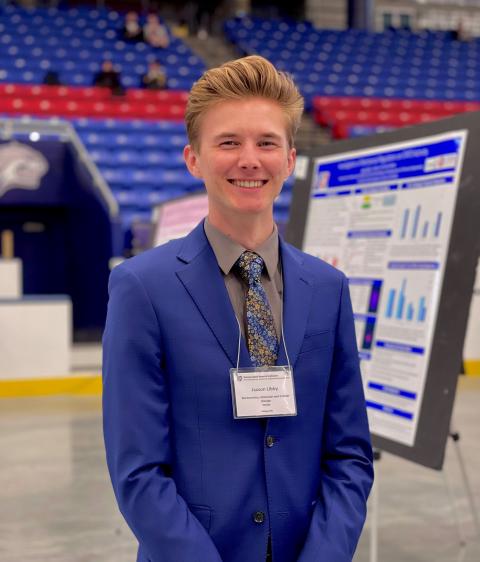Presenting Research to the World: Its Impact and the Lessons I Learned

In April, I had the opportunity to present my work in cancer research at the annual American Association for Cancer Research conference in Orlando, Florida. In attendance were CEOs of large biotech companies like Thermo-Fischer, high profile researchers and doctors—not to mention the more than 22,000 attendees from all over the world! This is one of the largest cancer research conferences on an international level. Presenting in front of that large crowd and talking to some of the biggest names in science would induce nerve-wracking emotions in most people but all I could think of was the exciting opportunity to share my work.
At the time, I was a senior biochemistry, molecular, and cellular biology major conducting research under the advisory of Dr. Sarah Walker in the molecular, cellular, and biomedical sciences department and Dr. Linqing Li of the chemical engineering department at UNH. Dr. Walker specializes in women's cancer: ovarian and breast. Dr. Li specializes in materials for growing cells called biomaterials. I have been able to utilize biomaterials to effectively grow breast cancer cells in a 3-dimensional environment that will be used in testing new cancer treatments. My work and findings allowed me to present my work to hopefully improve the world of cancer research. That said, getting to the point of being able to present was not a walk in the park.
I decided to go to the Orlando conference early in the fall semester of 2022. I thought to myself: With so much time, I’ll be fine by the time April comes around for the conference. Then, the months seemed to disappear. Since this event was held at such a high caliber, I was constantly worried about getting the next round of data. I had to present a perfect, complete project to the leaders of cancer research, and anything less seemed disastrous. So, for about six months, I gathered the newest and best data I could.
Presentation Day
The day came when I had to put all that data on a 44x36 inch piece of paper. It was then that I realized how hard it is to effectively present half a year’s worth of data and how hypercritical I could be. Every single picture was terrible, all my numbers were wrong, and every figure was out of place. But with the tremendous help of my advisors and many revisions, I was able to finish a cohesive poster that I was proud to bring to Orlando.
Then, it was time to show off all the work that I had done. I expected to be more nervous but after being at the conference for a few days, I was nothing other than excited to present. I had attended many other poster presentations and seminars that week prior to my time slot, so I had a feel for what was going to happen. I lost my voice by the end of the presentation. There were so many questions, comments, and suggestions about anything remotely related to the work I had done. It was probably the most I had ever spoken in my life. It was an incredible experience to be among big names and have people come up to me when the National Cancer Institute was right next to me also presenting. It put into perspective how important my work is to cancer research. That lit an even bigger and brighter flame of ambition to keep working on my project.
Impact of Research
I have now graduated with my bachelor of science degree and am continuing school at UNH to get my PhD in biochemistry. I will be working on my project of developing new, 3D growth models to screen cancer treatments and will hopefully be able to share even more new data in the years to come. To anyone who is conducting research and is thinking about presenting your work, do it!
I learned a few things during this experience. The first is to be reflective of your work, while not being too harsh on yourself. Research is meant to be rough around the edges or else nothing new would ever be discovered! The second is to take every opportunity you can to show your work. I got a lot of suggestions and new ideas that I will apply to my future experiments that I may never have thought of. Other people see things from a different angle, and a lot of times that angle is very useful. The last thing I learned is to be proud of the work done. It is easy to fall into the mindset of thinking the research is just a learning experience for yourself, but in reality, it is new information that will help the world outside of UNH.